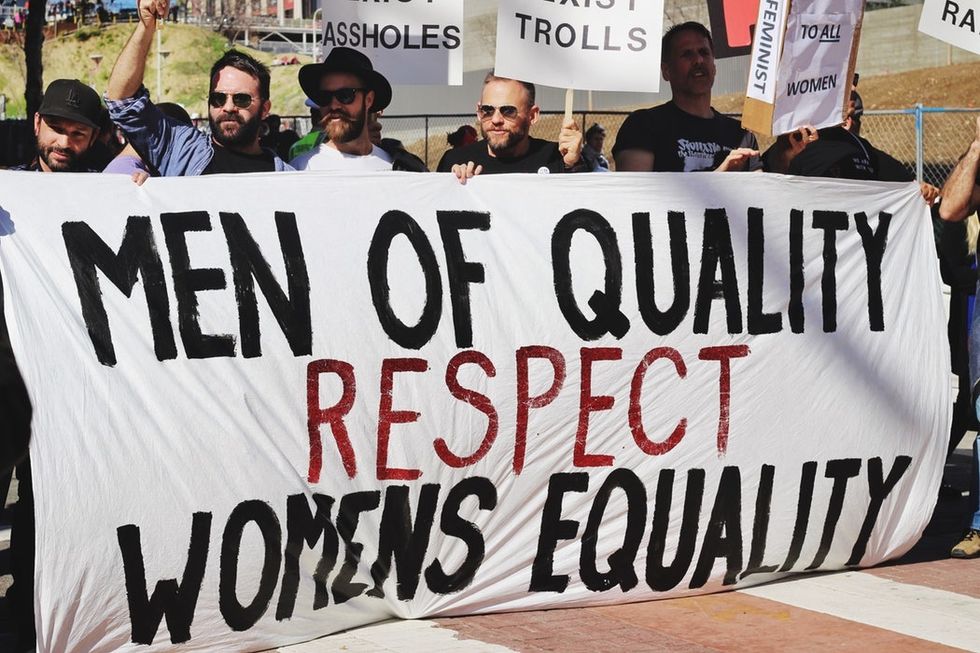On October 3rd, the University of Maryland hosted an event titled "Get With The Times," featuring a relevant, fast-paced political and social dialogue between the "New York Times'" political correspondent Alex Burns and Senator Bernie Sanders.
I was lucky enough to get a ticket.
To say that I was excited about the event would be an understatement. I'm from Portland, a city where the year 2016 brought with it Bernie Sanders hashtags (#feeltheBern!) and Harambe memes in equal ubiquity.
During the 2016 elections, I found myself captivated by Bernie's brand of democratic socialism—he spoke of an equal America, an America that would allow everyone to live with dignity. He was a kind of political superman to me.
The day I finally saw him speak in person, Sanders let me down.
Sanders started off strong, answering Burns' first few questions with a kind of passion, elegance and humorous realism that made 100+ liberal college students bob their heads in unison.
Those heads, however, stopped bobbing when onstage dialogue shifted to sexual assault, centering on two particularly recent cases involving prominent political figures Brett Kavanaugh and Keith Ellison.
Criticizing America's collective treatment of sexual assault survivors, Sanders was quick to denounce Republican Kavanaugh's reactions to the accusations made against him—and just as quick to brush off reports of Democratic Ellison's purported sexual violence.
I was upset by the obviously partisan nature of Sanders' take on sexual violence—but sadly, not surprised.
I mean, in the end, Sanders is a politician—It's hardly feasible for him to risk alienating his liberal voter base by suggesting a Democrat could have committed sexual assault, right?
Wrong.
Sexual assault is not about politics. It's about assault. It's about harm, and violence, and the disruption of people's lives—none of which should be partisan issues.
Sexual offenders are Democrats. They're Republicans. They're people who give to charity and walk their dogs; people who get coffee with friends and help you carry your grocery bags up so you can make it in one trip. They aren't typified by much—certainly not by what political party they affiliate themselves with.
And yet, as a country, we seem to have unanimously decided that sexual assault is simply another item on the political agenda. The term "rape" —much like "fake news"—has become weaponized, one more socio-politically charged word politicians can use to bolster their own party and discredit an opposing one.
Both accusers and accuseés of sexual assault seem to become instant political capital in the polarized environment of the United States, with politicians and constituents alike seizing on the horrors of assault to proliferate their respective beliefs and policies.
But In all the political fury surrounding sexual violence, we appear to have forgotten that sexual assault is something we should be unified against—not divided over. Sexual assault is bad—and that fact is independent of whether you identify as a Republican, a Democrat, or neither.
Sexual assault shouldn't be a partisan issue. And yet, somehow, we've managed to make it one.
Someday, I want to be able to say that sexual assault ISN'T a partisan issue, instead of saying that it SHOULDN'T be one.
Here's to hoping.






 StableDiffusion
StableDiffusion StableDiffusion
StableDiffusion StableDiffusion
StableDiffusion Photo by
Photo by  Photo by
Photo by  Photo by
Photo by 
 Photo by
Photo by  Photo by
Photo by  Photo by
Photo by  Photo by
Photo by  Photo by
Photo by 




